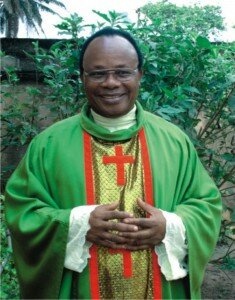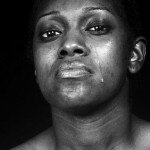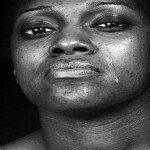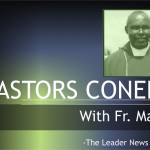The Cry of the African widow (3)
10. SUMMARY OF THE RITES

Fr Anthony E. Onyeocha
For the sake of brevity we wish to quickly summarise the mourning rites that have been documented by different experts. Our authors include the UNICEF and others. According to a study recently carried out in Ozubulu town in Nnewi, the women groups of both the Catholic and Anglican communions have also jointly identified the principal dehumanising widowhood rites and practices.
(1) Swearing on the dead body of husband.
(2) Making her eat kola-nut placed on the dead body of the deceased.
(3) Making her eat from a particular plate with her left hand for the period of mourning.
(4) Crawling over husband’s corpse for the purpose of exoneration.
(5) Making her marry a relation of the deceased husband.
(6) Making her have sex with a man for cleansing.
(7) Making her go into the distant bush alone in the dark during the mourning period.
(8) Making the woman during the mourning period to expose her naked body outside the house both morning and evening.
(9) Loss of right of inheritance, if she has no male child.
(10) Compulsory fasting on the day of her husband’s burial.
(11) Punitive refusal to shave the widow’s hair by the UMUADA.
(12) A Widow suspected of being instrumental to the husband’s death is sometimes called to the village gathering and publicly disgraced without proof.
(13) Demanding her to cook and display food outside in the night for her dead husband. – If the food disappears by morning then she is free of the husband’s death. If the food still remains uneaten by the next morning then it is concluded that she has a hand in the husband’s death.
(14) Widows are sometimes rejected in social gathering and contacts. Fellow women are advised not to communicate with them.
(15) Making her drink the washings from husband’s corpse to exonerate her from accusations of killing her husband.
(16) A widow is forced to sleep in the same room with the corpse of her husband.
(17) Dispossessing her of property or disinheritance.
(18) Prolonged mourning for weeks, months or even for a period of one year.
(19) The widow is forced out of her matrimonial home.
(20)The woman is forced to shave her hair.
(21) Deprivation of basic personal hygiene, for example not allowed to take her bath for days.
(22) She is forced to wail incessantly in order to demonstrate her remorse and grief. The outburst of intense wailing, weeping and hysteria, full vent of grief by beating the chest, rolling on the floor and aimless hours of crying are common expectations as to the actions and behaviour of a widow. In some cultures in Igbo land, the widow is fined when she does not cry or the crying is judged insufficient. (Korieh, 19: 46) On the contrary, men are not expected to cry in public or to show outward grief.
(23) A widow who dies within the mourning period is stigmatised and denied the burial rites.
(24) In the olden days widows of chiefs and big men were buried with their husbands.
(25) A few months ago (this 2013) a young widow from Akabo in Ikeduru LGA complained that UMUADAS shaved her private parts and attempted rubbing the blood of a hen on it as a sign of cleansing.
The mental anguish caused by such physical abuse, the sudden destitution, homelessness, starvation and insults lead a considerable number of widows to commit suicide. No research has been done to get an idea of numbers. A suicide of a widow is usually made to look like an accident.
11. Four Conflict cases
Widows are not free. They cannot say no to these practices. It is the community that controls everything. In Ozubulu town we have four cases of widows who tried to behave differently. The community reacted harshly.
On one occasion, a widow was alleged to have maltreated her husband and had not taken good care of him when he was on his sick bed. The Umuada (the daughters union) accused her of being responsible for her husband’s death, and ruled that if the woman was contesting, then she should prove her innocence by drinking the washings of her husband’s corpse. Where she refused to drink, she would be ostracised and dragged along the streets to her father’s house. This is an accepted traditional practice (igu mmiri ozu). Another option was for her to crawl over her husband’s corpse (ige ukwu ozu). The women relations of the widow and some CWO members at the funeral resisted this and a big conflict ensued.
Another case involved a young widow working in a bank in Lagos. She was required to restrict her movement and not go for work for six months. She was to be in the village, confined to the compound in mourning dress. The widow explained that she would loose her job and disrupt her children’s schooling in Lagos. The community sanctioned her for breaking the traditional norm of not mourning her husband for the customary duration (ilu uju). The Umuada fined her the sum of N 10,000.00 (ten thousand) and compelled her to stay at her own father’s house for one month as a punishment.
In the third event, the Umuada refused to shave the head of the widow because they alleged that she did not show enough sorrow that her husband died. They alleged that she was conversing freely and even smiled with sympathisers. It was a taboo for a widow to laugh or look cheerful when her husband has not been buried. She was appropriately fined for the misdemeanour. Not shaving one’s hair for the husband is a sign of not mourning him and is feared to attract the dead husband’s wrath on the widow and other members of the family.
The fourth event was that of a widow who died six months after her husband’s death. The Christian community gathered for her burial and funeral, but other members of her village resisted and insisted that the woman should be thrown into the evil forest without mourning for her since she committed an abomination by dying before the end of the traditional mourning period.
These are the major forms of torture that await the African widow in the name of tradition or culture. The rites without doubts involve various forms of cruelty to women, expose them to serious health hazards and show a great deal of violation of the right to life and dignity. Many of them contain elements that are immoral. Widowhood rites have been internationally recognised as a violation of the human rights of women.
However, there is an astonishing ignorance about and lack of public concern for the suffering of widows and their families on the part of governments, the international community, and civil society, and even women’s organizations. In spite of four UN World Women’s Conferences (Mexico 1975, Copenhagen 1980, Nairobi 1985, and Beijing 1995) and the ratification by many countries of the 1979 UN Convention on the Elimination of All Forms of Discrimination against Women (CEDAW), widows are barely mentioned in the literature of gender and development, except in the context of aging.
You may thank your God if these ugly practices no longer exist in your own part of Igboland, but it is still painful to think of the fact that these cruel practices still thrive in many of our neighbouring villages and communities.
Actually, many of us will not know the whole implication of widowhood rites in many areas of Africa especially in Nigeria until of course we do some more research work. I recommend you to read my book, TEARS OF WIDOWHOOD. This book is still in print and will be made public by early next year 2014.
As an African I feel deeply ashamed that in this twenty-first century, in spite of over 100 years of Christianity, of so many years of western education and of democracy that these inhuman, barbaric and primitive rites, many of which are based on superstition and fear of the deities are still observed. Time has come for a revolt. We must be born again. We must be willing to hear the voices of these widows, take them seriously, address their needs and liberate them from their modern slavery. They are suffering.
Unfortunately, these things happen before the so-called Christian mothers and fathers who tacitly, perhaps, support these inhuman and degrading practices imposed on widows. The priests and pastors seem to be powerless in this devaluation of womanhood through the shameful treatment of widows, and even allow the perpetrators to participate freely in the church’s activities. It is here that we call on the church and her leaders to play the prophetic role that the Lord has placed on them.
To be contd.
REV FR ANTHONY Ekendu. ONYEOCHA IS A PRIEST OF CATHOLIC ARCHDIOCESE OF OWERRI NIGERIA. PHONE NO:
Read also Related Posts
Comments
comments


 The Cry of the African widow
The Cry of the African widow
 The Cry of the African widow (2)
The Cry of the African widow (2)
 Christian Home, Hospitable Home
Christian Home, Hospitable Home
